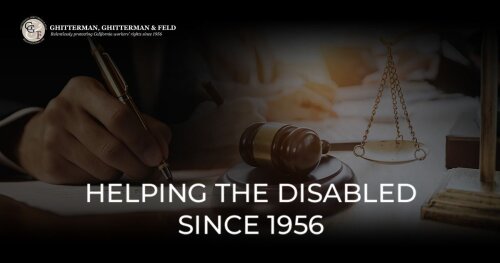Best Hiring & Firing Lawyers in Vermont
Share your needs with us, get contacted by law firms.
Free. Takes 2 min.
Or refine your search by selecting a city:
List of the best lawyers in Vermont, United States
About Hiring & Firing Law in Vermont, United States
Hiring and firing employees in Vermont involves a combination of state and federal laws designed to strike a balance between the interests of employers and the rights of workers. Vermont is an “at-will” employment state, which generally means that both employees and employers can end the employment relationship at any time, with or without cause or notice. However, there are crucial exceptions and legal guidelines that both parties must follow to ensure fair treatment and avoid legal disputes. These rules touch on discrimination, wage laws, final paychecks, and more. Understanding these basics is important for both employers and employees in Vermont.
Why You May Need a Lawyer
There are several common circumstances where individuals or businesses may need legal assistance regarding hiring and firing in Vermont. For employees, issues may arise if they believe they were wrongfully terminated, discriminated against during hiring or firing, or did not receive their final paycheck or owed compensation. Employees may also seek counsel if they face retaliation for whistleblowing or for taking legally protected leave. On the employer side, businesses often consult lawyers to ensure their hiring processes, employee handbooks, and termination procedures comply with local and federal laws to avoid potential lawsuits. Lawyers can also help navigate complex situations such as mass layoffs, employment contracts, or disputes over noncompete agreements.
Local Laws Overview
Vermont’s hiring and firing laws integrate both federal regulations and state-specific requirements. The foundational elements include:
- Employment at Will: Most employment relationships can be terminated by either side at any time, but with significant exceptions for illegal reasons such as discrimination.
- Anti-Discrimination: Vermont law prohibits discrimination based on race, color, religion, ancestry, national origin, sex, sexual orientation, gender identity, age, disability, HIV status, place of birth, or crime victim status, in addition to federal protections.
- Wage and Hour Laws: Employers must comply with minimum wage standards, provide timely payment of wages, and pay all earned compensation, including unused vacation time if company policy requires it, upon termination.
- Final Pay: Employees who are fired or laid off must generally receive their final pay within 72 hours, while employees who quit must be paid by the next regular payday.
- Background Checks: Employers are allowed to conduct background checks but must obtain consent and comply with federal Fair Credit Reporting Act (FCRA) guidelines as well as specific Vermont limitations, such as restrictions on the use of credit information.
- Notice Requirements: Vermont law includes requirements for giving notice of certain benefits, such as continuation of health care or unemployment options.
Frequently Asked Questions
Can an employer in Vermont fire someone for any reason?
Vermont is an at-will state, so employers can generally terminate employees for almost any reason. However, it is illegal to fire someone based on protected characteristics such as race, gender, age, disability, sexual orientation, or for retaliatory reasons, such as whistleblowing or taking family medical leave.
Are there requirements for the final paycheck after termination in Vermont?
Yes. If an employee is fired or laid off, employers must pay all wages earned (including salary, vacation pay if applicable, and bonuses) within 72 hours. If an employee quits, payment is due by the next scheduled payday.
What protections exist against discrimination during hiring?
Vermont prohibits discrimination based on race, religion, gender, sexual orientation, national origin, age, disability, and several other categories. These protections apply to job postings, recruitment, application processes, interviews, and hiring decisions.
Can private employers ask about criminal history during the hiring process?
Vermont’s “ban the box” law restricts private employers from asking about criminal history on initial job applications. Employers may inquire about convictions later in the hiring process, but must give candidates a chance to explain.
Is severance pay required when an employee is fired?
No, Vermont law does not require employers to provide severance pay unless it is outlined in a company policy, employment contract, or union agreement.
What should employees do if they believe they were wrongfully terminated?
Employees should contact the Vermont Human Rights Commission or consult an employment lawyer to discuss the circumstances and determine if their termination violated any laws or contracts.
Are there restrictions on drug testing during hiring in Vermont?
Yes. Vermont employers wishing to conduct drug testing during the hiring process must follow strict procedures, including providing written notice and using a certified laboratory. Pre-employment testing is tightly regulated.
Can employers require a noncompete agreement in Vermont?
Noncompete agreements are enforceable in Vermont only under limited circumstances. They must be reasonable in scope, duration, and geographic area, and must protect a legitimate business interest.
Are layoffs handled differently than individual firings?
In general, layoffs must still comply with Vermont’s final paycheck rules. Larger layoffs may trigger additional federal requirements (such as WARN Act notice) if enough employees are affected.
What are the rules around reference checks and employment verification?
Employers in Vermont can provide truthful job performance information but must be careful to avoid defamation. Many stick to confirming dates of employment and job titles. Employees can authorize or decline reference checks.
Additional Resources
For more information or assistance with hiring and firing laws in Vermont, consider reaching out to the following:
- Vermont Department of Labor - Information on wage and hour standards, unemployment insurance, and employment issues
- Vermont Human Rights Commission - Handles discrimination complaints and provides guidance on anti-discrimination laws
- U.S. Equal Employment Opportunity Commission (EEOC) - Enforces federal anti-discrimination laws
- Legal Services Vermont - Offers free or low-cost legal help for eligible Vermonters
- Local bar associations or employment lawyers - For personalized legal advice
Next Steps
If you need legal assistance related to hiring or firing in Vermont, start by documenting any relevant communications, contracts, or policies. Gather pay stubs, offer letters, employee handbooks, and correspondence that may be important. Consider contacting one of the resources listed above, or schedule a confidential consultation with a local employment attorney. Acting promptly can help protect your rights and clarify your options, whether you are an employer or employee.
Lawzana helps you find the best lawyers and law firms in Vermont through a curated and pre-screened list of qualified legal professionals. Our platform offers rankings and detailed profiles of attorneys and law firms, allowing you to compare based on practice areas, including Hiring & Firing, experience, and client feedback.
Each profile includes a description of the firm's areas of practice, client reviews, team members and partners, year of establishment, spoken languages, office locations, contact information, social media presence, and any published articles or resources. Most firms on our platform speak English and are experienced in both local and international legal matters.
Get a quote from top-rated law firms in Vermont, United States — quickly, securely, and without unnecessary hassle.
Disclaimer:
The information provided on this page is for general informational purposes only and does not constitute legal advice. While we strive to ensure the accuracy and relevance of the content, legal information may change over time, and interpretations of the law can vary. You should always consult with a qualified legal professional for advice specific to your situation.
We disclaim all liability for actions taken or not taken based on the content of this page. If you believe any information is incorrect or outdated, please contact us, and we will review and update it where appropriate.
Browse hiring & firing law firms by city in Vermont
Refine your search by selecting a city.










